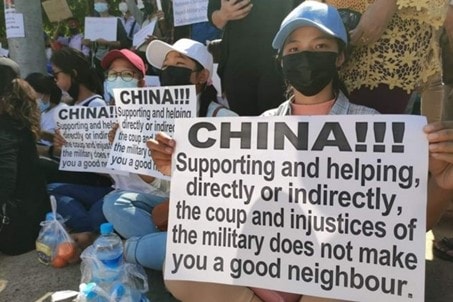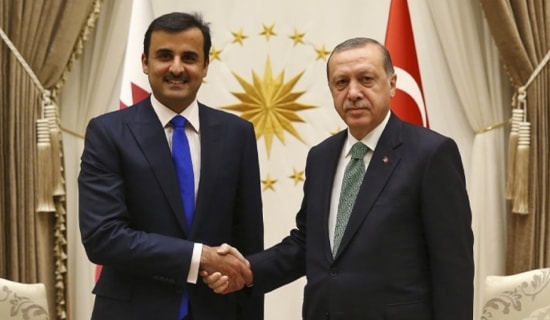In a February 18, 2021 article, Chinese dissident Wang Dan, leader of the Chinese democracy movement and one of the student leaders of the 1989 Tiananmen Square protests, stated that China is supporting the coup instigated by the Myanmar military on February 1 in an attempt to "draw Myanmar to its side" and further consolidate its status as a regional hegemon in Southeast Asia. The article, titled "China's Path To Regional Hegemony Is Not Smooth," was published by the Hong Kong pro-democracy media outlet Apple Daily.
Wang wrote that China's refusal to expressly condemn Myanmar's military reflects its political opportunism in trying to consolidate its influence in the region. He suggested that this will not be "a smooth ride on the sunny side of the road" for the CCP, as political forces in Myanmar "suspect that China has been working behind doors" to incite the coup – resulting in civil demonstrations against China at its embassy in the city of Yangon.
Wang further contended that China's "path to hegemony is paved with cash" in the form of economic aid to Southeast Asian states, without gaining the "real trust of the people." This is starkly reflected, he argued, in a recent survey of attitudes towards China in ASEAN.
It is worth noting that Myanmar has now entered its fifth week of civil demonstrations and disobedience, as anti-China sentiment increases among the anti-coup demonstrators in Myanmar. On March 14, Chinese-financed factories were set ablaze in an industrial zone of Yangon. The Chinese Embassy in Yangon stated that factories had been targeted and Chinese personnel injured.[1] On March 12, Kyaw Win, founder and executive director of the Burma Human Rights Network (BHRN), tweeted: "A warning to the Fascist junta. If one civilian [is] killed one Chinese factory will become ashes."[2]
Below is Wang's article:[3]

Chanting "Shame on you China" in unison, dozens of youths gathered outside the Chinese embassy in Yangon, the largest city of Myanmar, on February 14, 2021, to protest against Beijing's support to the military junta in Myanmar. (Source: ANI)
China Does Not Wish To See Its Neighboring Countries Make Progress Towards Democracy
"The military coup in Myanmar is a major retrograde step in the democratization of the country, which observers believe will help China further consolidate its status as a regional hegemon in Southeast Asia. Apparently, China has also seen such a 'strategic opportunity.' For the Chinese Communist Party (CCP), it is indeed a golden opportunity. As a totalitarian state, China certainly does not wish to see its neighboring countries make progress towards democracy, since they could provide a model for Chinese people that is unfavorable to the CCP's rule.
"From the perspective of international politics, European and American countries have distanced themselves from Myanmar in recent years due to the Rohingya Crisis. It was exactly because of such an approach that Myanmar's military saw an opportunity to bring down Aung San Suu Kyi. Without doubt, the military will face strong condemnation and sanctions by the international community.
A Risky Attempt To Forge Alliance Amid The Coup
"At a time like this, it is certain that China can further draw Myanmar to its side as a firm ally by expressing support for Myanmar's military junta. For this very reason, we can see that China has refused to expressly condemn Myanmar's military on the pretext that the incident belongs to Myanmar's internal affairs. It even refers to the takeover as a 'major cabinet reshuffle' instead of a 'coup' and has defended Myanmar's military in every possible way in the United Nations Human Rights Council.
"It is common knowledge that China has the ambition to seize the opportunity to expand its political sphere of influence. For the CCP, however, establishing and consolidating a regional hegemony in Southeast Asia is not a smooth ride on the sunny side of the road.
"First, trying to forge an alliance through interference in the internal political change of a Southeast Asian country carries a high political risk. Take the Myanmar coup. Thanks to actions taken by the Chinese government, the political forces in Myanmar that oppose the coup now suspect that China has been working behind doors to effectively incite Myanmar's military to stage the coup. Not only have people staged protests in front of the embassy of China, but student unions from 18 universities also released an open letter to Xi Jinping days ago, expressing their dissatisfaction with China's support for the military. Some citizens have even called for a boycott on Chinese goods.
"Although the situation remains under the military's control after the coup, pressure from European and American countries will definitely continue. It remains uncertain whether Myanmar's military can withstand such pressure and face the economic sanctions that ensue. The recent release of tens of thousands of people in opposition arrested by the military is a signal. If, facing pressure from the international community, Myanmar's military eventually reaches a certain agreement with Aung San Suu Kyi, it will be impossible for her and her supporters to be as close to China as before after they regain political influence. Interference in Myanmar's politics is in fact a gamble for the CCP.
"Second, for a long time, China's expansion into Southeast Asia has been primarily reliant on economic aids involving huge sums of money. Its path to hegemony is paved with cash, so it is impossible for China to gain the real trust of the people of Southeast Asia. On January 10th, the ISEAS – Yusof Ishak Institute in Singapore released a report on the Trends in Southeast Asia in 2021. According to their research, Southeast Asian countries have vastly increasing expectations of the new Biden administration, while their trust in China has decreased year by year.
"Although 44% of respondents believe that China is the ASEAN dialogue partner that has provided the most assistance for the region during the pandemic, a higher percentage than the 18.2% for Japan and the 10.3% for the EU, 63% of them still do not trust China to 'do the right thing' so as to contribute to global peace, security, prosperity and governance. This percentage is higher than the 51.5% in the 2019 survey. Only 16.5% of people say they trust China (the level of trust in the US is 48.3%). As for the reasons for their distrust, 51.8% of the respondents are worried that China might use its economic and military power to threaten the interests and sovereignty of other countries.
Money Can't Conceal China's Ambition
"The respondents of this survey come from government agencies, regional and international agencies, civic groups, academia, the business sector and the media in the 10 ASEAN countries. The survey reflects the views of the political elite and big business in Southeast Asian countries. For the CCP, the findings of the survey have come as a stern warning. They illustrate that the mere spending of money cannot win the hearts of people or conceal its ambition to gain hegemony, but will arouse the vigilance of all countries.
"A lot of money has been spent, still there is no trust. So China has made a fool of itself. This also shows that it is not so easy for China, which is 'so poor that all it has left is money,' to become a regional hegemon."




